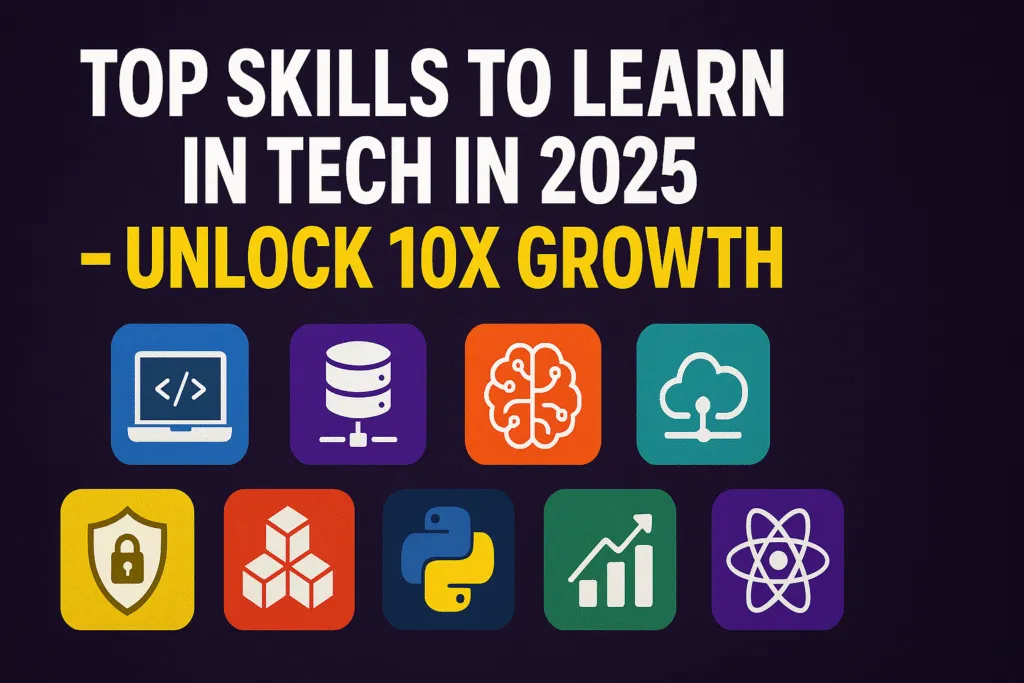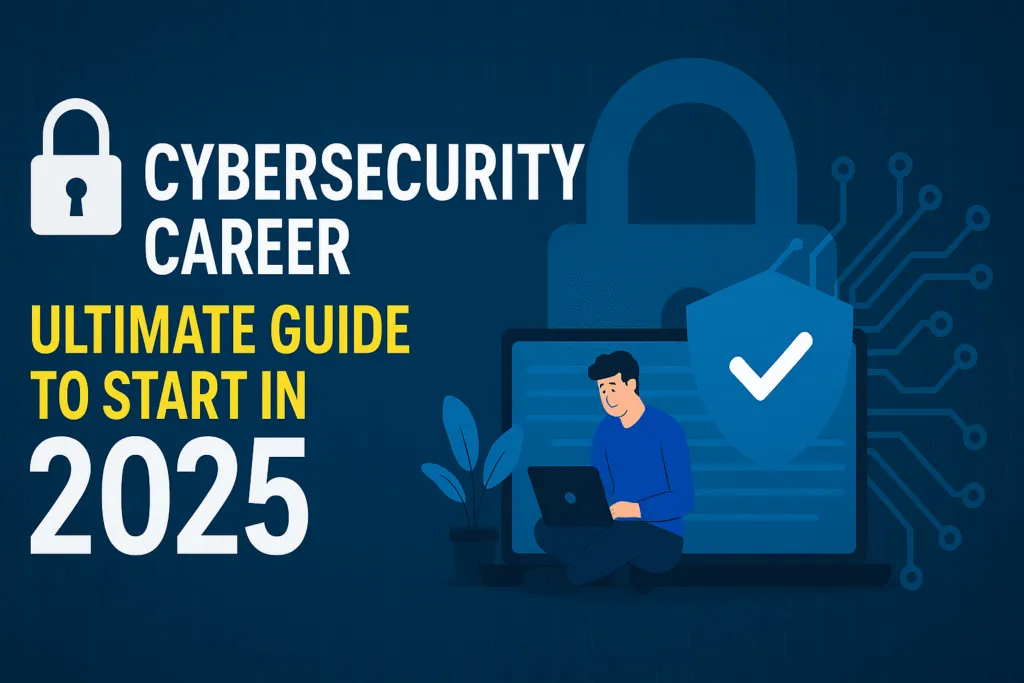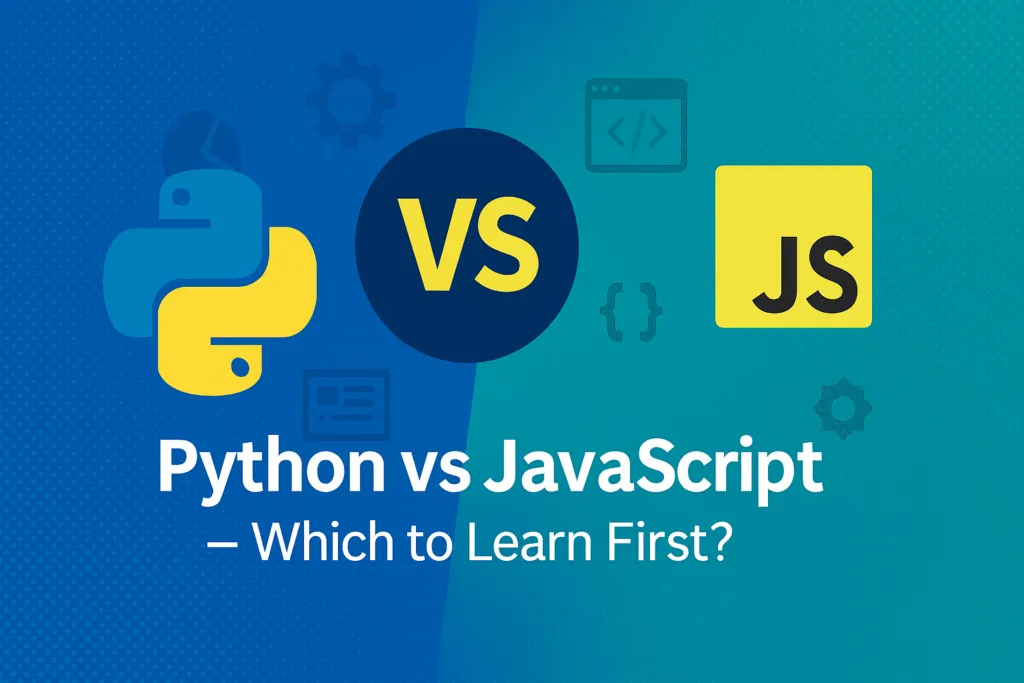Introduction: Why Tech Certifications Are Crucial in 2025
As we step deeper into the digital era, the tech industry is evolving faster than ever. With new tools, platforms, and frameworks emerging each year, professionals can no longer rely solely on degrees or experience. In 2025, tech certifications are proving to be one of the most effective ways to stay competitive in the job market.
Employers today are not just looking for knowledge—they want proof of expertise. Tech certifications provide that validation. Whether you’re a software developer, cloud engineer, cybersecurity analyst, or data scientist, having the right certification can set you apart from hundreds of applicants. It shows that you’re up-to-date with the latest technologies and serious about your professional growth.
Another reason why tech certifications are gaining importance is the rapid rise of remote and global hiring. Recruiters hiring across countries often prefer candidates with certifications, as they offer a standardized way to measure skills. In a world where resumes are scanned in seconds, a well-known certification can be the difference between getting shortlisted or skipped.
Moreover, many high-paying roles now list specific certifications as either required or preferred. That means getting certified isn’t just about learning—it can directly impact your income and career growth.
Tech certifications also offer flexibility. Many are self-paced, affordable, and available online, making them accessible to both students and working professionals. Whether you’re entering the field or leveling up your current role, certifications can bridge the gap between where you are and where you want to be.
In short, 2025 is the year to invest in yourself. With the right tech certifications, you’re not just learning—you’re proving, positioning, and preparing for long-term success in the ever-evolving tech world.
How to Choose the Right Certification for Your Career
With so many tech certifications available in 2025, choosing the right one for your career can feel overwhelming. But making a smart choice can open doors to better job opportunities, higher salaries, and long-term growth in your field. The key is to align your certification with your goals, interests, and industry demands.
The first step is to understand your current skill level. Are you a beginner trying to enter the tech world, or an experienced professional looking to specialize further? Entry-level certifications like CompTIA A+, Google IT Support, or AWS Cloud Practitioner are great for those starting out. On the other hand, experienced individuals may benefit more from advanced options like AWS Solutions Architect, CISSP, or PMP.
Next, evaluate the industry or domain you want to work in. Different sectors value different tech certifications. For instance, cybersecurity professionals might focus on certifications like CEH or CISSP, while cloud engineers should look at AWS, Azure, or Google Cloud certifications. If you’re in data science or AI, consider certificates from IBM, Microsoft, or specialized platforms like Coursera and DataCamp.
It’s also important to research the job market. Use LinkedIn, job boards, and industry reports to see which certifications are in demand for the roles you aspire to. Pay attention to job listings in your desired location or remote roles globally. Certifications that frequently appear in job requirements are often worth prioritizing.
Another factor to consider is credibility. Not all certifications carry the same weight. Go for certifications offered by well-known companies or globally recognized organizations. These tend to be more trusted by employers and recruiters.
Don’t overlook the cost, time, and difficulty level. Some tech certifications require months of study and cost hundreds of dollars, while others are quicker and more affordable. Make sure the investment matches your budget, schedule, and long-term return on investment.
You should also think about how the certification fits into your career path. Is it a stepping stone to a larger goal or just a short-term boost? Some certifications are part of a broader roadmap, allowing you to level up gradually as you gain experience.
Finally, read reviews, join online communities, and talk to people who have already taken the certification you’re considering. Their insights can help you avoid common mistakes and choose a path that’s truly valuable.
In conclusion, picking the right certification is not about chasing the trend—it’s about making a strategic move that aligns with your passion, profession, and future plans. With the right tech certifications, you’re not just adding a badge to your resume; you’re investing in your future and proving your commitment to growth in the ever-evolving tech landscape.
Top 10 Tech Certifications That Will Dominate 2025
As technology continues to evolve at breakneck speed, professionals across the globe are looking for ways to stay competitive. One of the smartest ways to do that is by earning tech certifications that match the latest trends, tools, and employer demands. In 2025, these certifications are more than just a learning credential—they are proof of your relevance in a fast-paced industry.
Below are the top 10 tech certifications that are expected to dominate the job market in 2025, across cloud computing, cybersecurity, project management, and more:
1. Google Professional Cloud Architect
Cloud continues to dominate, and Google Cloud is rising rapidly. This certification validates your ability to design, manage, and secure scalable cloud architecture on Google Cloud Platform (GCP), making it ideal for cloud architects and DevOps professionals.
2. AWS Certified Solutions Architect – Associate
Amazon Web Services (AWS) still leads the cloud industry. This certification is a must-have for professionals who design distributed systems and scalable applications. It’s among the most sought-after tech certifications for cloud roles in 2025.
3. Microsoft Certified: Azure Solutions Architect Expert
With Azure gaining popularity in enterprise environments, this certification proves your expertise in implementing solutions on Microsoft’s cloud platform. It’s highly valued by companies using Microsoft ecosystems.
4. Certified Information Systems Security Professional (CISSP)
Cybersecurity remains a top concern, and CISSP is a gold standard in this field. It’s perfect for professionals aiming for senior-level security roles and offers strong credibility in the information security space.
5. CompTIA Security+
This is an excellent entry-level certification for those breaking into cybersecurity. It covers essential security topics and is recognized globally. It also acts as a gateway to more advanced certifications like CEH or CISSP.
6. Certified ScrumMaster (CSM)
Agile project management is now mainstream in both tech and non-tech sectors. The CSM certification shows you can lead Agile teams efficiently and deliver projects using Scrum principles. It’s widely accepted by software companies and startups.
7. Cisco Certified Network Associate (CCNA)
Networking remains a foundational tech skill, and CCNA is the go-to certification for those looking to build or strengthen a career in IT networking and infrastructure. It covers routing, switching, security basics, and more.
8. PMP – Project Management Professional
PMP continues to be one of the highest-paying certifications across industries. For tech professionals involved in managing teams or large-scale projects, PMP certification demonstrates deep project management expertise and leadership.
9. Oracle Certified Java Programmer
Java remains a dominant programming language in enterprise-level applications. This certification is great for backend developers and engineers looking to validate their skills and land jobs at major software firms.
10. IBM / Coursera Data Science Certifications
Data science is one of the fastest-growing fields, and certifications from platforms like IBM, Coursera, or even DataCamp can help professionals break into roles like data analyst, machine learning engineer, or AI developer. These certifications focus on practical projects and are especially useful for beginners or mid-level professionals.
In 2025, employers are prioritizing practical skills and proof of expertise over traditional degrees. That’s why the right tech certifications can give you a serious edge—whether you’re looking to get hired, promoted, or pivot into a new tech domain.
Each of these certifications aligns with high-demand roles and industries and can significantly boost your credibility and earning potential. The best part? Many of them are accessible online and can be completed at your own pace.
As the competition intensifies, having one or more of these tech certifications on your resume could be the key to standing out in a saturated job market. Choose wisely based on your goals, and you’ll be future-ready for whatever 2025 brings.
Emerging Tech Domains & Their Most Valuable Certifications
The tech landscape in 2025 is not just expanding—it’s transforming. Traditional IT roles are being redefined as new technologies emerge and reshape the industry. From artificial intelligence to blockchain, professionals need to keep up with these trends to stay relevant. One of the most effective ways to do that is by earning tech certifications that align with these high-growth domains.
Here’s a look at the most exciting emerging tech areas in 2025 and the tech certifications that can help you break into or advance in these fields.
1. Artificial Intelligence (AI) and Machine Learning (ML)
AI and ML are at the heart of automation and intelligent systems. These technologies are used in everything from chatbots and recommendation engines to advanced data analytics.
Top Certifications:
- IBM AI Engineering Professional Certificate (Coursera)
- TensorFlow Developer Certificate
- Microsoft Certified: Azure AI Engineer Associate
These certifications focus on real-world AI/ML applications, helping professionals build smart systems using Python, neural networks, and machine learning libraries.
2. Cybersecurity
With cyber threats becoming more complex, cybersecurity roles are in high demand. From ethical hacking to enterprise risk management, this field is rich with opportunity.
Top Certifications:
- Certified Ethical Hacker (CEH)
- Certified Information Security Manager (CISM)
- CompTIA Cybersecurity Analyst (CySA+)
These tech certifications validate your ability to detect, analyze, and prevent threats, making you a critical asset in today’s digital-first world.
3. Cloud Computing
Cloud isn’t just a trend—it’s the foundation of modern IT infrastructure. Businesses are shifting rapidly to cloud platforms, and certified professionals are leading the migration.
Top Certifications:
- AWS Certified DevOps Engineer
- Google Professional Cloud Developer
- Microsoft Certified: Azure Administrator Associate
Whether you’re in operations, architecture, or development, cloud-related tech certifications open doors to high-paying roles.
4. Data Science and Big Data
Data has become the new oil, and those who can interpret it hold the key to better decision-making. From analytics to predictive modeling, data experts are vital across industries.
Top Certifications:
- IBM Data Science Professional Certificate
- Google Data Analytics Certificate
- Cloudera Certified Associate (CCA) Data Analyst
These programs cover Python, SQL, data visualization, and machine learning—all essential tools for today’s data-driven roles.
5. DevOps & Automation
DevOps combines development and IT operations for faster, more efficient delivery cycles. As automation becomes standard, DevOps skills are becoming non-negotiable.
Top Certifications:
- Docker Certified Associate
- Certified Kubernetes Administrator (CKA)
- HashiCorp Certified: Terraform Associate
These tech certifications demonstrate your ability to manage infrastructure as code, containerized apps, and CI/CD pipelines.
6. Blockchain
Once limited to cryptocurrency, blockchain now powers everything from supply chains to smart contracts. Its demand is rising in finance, logistics, and even healthcare.
Top Certifications:
- Certified Blockchain Developer (CBD)
- Blockchain Council Certifications
- IBM Blockchain Foundation Developer
These help professionals understand blockchain architecture, develop smart contracts, and implement decentralized applications (dApps).
7. Internet of Things (IoT)
IoT is expanding into smart homes, wearables, industrial automation, and more. It’s a blend of hardware, software, and cloud—perfect for tech generalists and specialists alike.
Top Certifications:
- Microsoft Certified: Azure IoT Developer
- IoT Professional Program by Stanford Online
These certifications focus on building secure, scalable, and connected IoT solutions using real-world devices.
In 2025, choosing certifications based on emerging domains is more than just a strategy—it’s a career accelerator. By focusing on high-growth fields and earning relevant tech certifications, you’re not just upgrading your skills—you’re investing in long-term relevance and resilience in a rapidly changing tech world.
Certification vs. Degree: Which One Holds More Weight in 2025?
In the ever-evolving world of technology, the debate between tech certifications and traditional degrees has never been more relevant. As we move further into 2025, both paths offer distinct advantages—but which one truly holds more value in today’s competitive job market?
Let’s break it down.
Traditionally, a college degree was considered the gold standard for launching a successful tech career. It provided a broad foundation in computer science, problem-solving, and theoretical concepts. However, the fast pace of the tech industry has exposed one major limitation—degrees often can’t keep up with the speed of innovation. Many curriculums are outdated by the time students graduate.
On the other hand, tech certifications are designed to be agile. They focus on specific, in-demand skills and technologies that employers need right now. Whether it’s cloud computing, cybersecurity, data science, or DevOps, certifications offer a faster and more targeted way to gain job-ready skills. Most can be completed in weeks or months instead of years, and many are affordable or even free.
In 2025, companies are placing increasing value on demonstrated skills rather than just academic credentials. Recruiters are actively searching for candidates with industry-recognized tech certifications from providers like AWS, Google, Microsoft, and Cisco. These badges serve as proof that you not only understand the technology but can apply it in real-world scenarios.
That said, degrees still hold weight—especially for certain roles. Senior positions, leadership roles, and research-driven careers may still favor candidates with formal education. A degree also teaches soft skills, communication, and long-term project thinking, which are often not covered in certification programs.
However, the shift is clear: tech certifications are gaining ground, particularly for roles in cloud computing, AI, cybersecurity, and software development. Many companies no longer require a degree if you can prove your capabilities with hands-on experience and certifications.
The ideal path in 2025 is often a hybrid one. A degree can give you a strong foundation, while tech certifications keep you current with tools and platforms that are constantly changing. Certifications also offer lifelong learning opportunities, helping professionals adapt as new technologies emerge.
In conclusion, the answer isn’t black or white. A degree can open doors, but tech certifications can get you through them faster—especially in a results-driven industry where performance and up-to-date skills matter most. If you’re just starting out, certifications can be a quick and impactful way to enter the field. If you already have a degree, adding certifications can future-proof your career and help you specialize in high-demand areas.
In 2025, it’s not about choosing one over the other—it’s about combining both strategically to create a powerful, adaptable, and future-ready tech career.
Top Online Platforms Offering Industry-Recognized Certifications
In 2025, the way we learn and upskill has changed dramatically. Traditional classrooms have taken a backseat, and online learning has become the new norm—especially for professionals aiming to earn tech certifications. Thanks to several leading platforms, gaining recognized certifications from top tech companies is now more accessible than ever.
Here are some of the best online platforms offering industry-recognized tech certifications that can help you boost your career from anywhere in the world.
1. Coursera
Coursera partners with universities and major tech companies like Google, IBM, and Meta to deliver professional certification programs. Whether you’re looking to get into data science, AI, cloud computing, or cybersecurity, Coursera offers flexible, self-paced learning with recognized credentials. Certifications like the Google IT Support or IBM Data Science Professional Certificate are widely accepted in the industry.
2. edX
Similar to Coursera, edX offers professional certificates, MicroMasters, and even full online degrees in collaboration with institutions like Harvard, MIT, and Microsoft. Tech professionals can find courses in areas such as DevOps, software engineering, and cloud architecture. edX’s professional tracks are ideal for learners who want academic-level depth with practical skills.
3. Udacity
Focused heavily on real-world tech skills, Udacity’s “Nanodegree” programs are tailored for job readiness. Their programs are created with input from industry giants like Google, AWS, Nvidia, and Microsoft. If you’re interested in AI, data engineering, or programming, Udacity offers intensive, project-based tech certifications that employers value.
4. LinkedIn Learning
Formerly Lynda.com, LinkedIn Learning offers thousands of tech-focused courses in software development, IT, data science, and project management. While the certifications here are not always vendor-certified, they’re great for skill-building and show up directly on your LinkedIn profile—adding instant visibility to your resume.
5. Pluralsight
Known for its deep-dive courses in IT and software development, Pluralsight is a favorite among tech professionals. Their certification prep content for AWS, Azure, CompTIA, and Google Cloud is highly rated. It’s especially useful for continuous learners preparing for exams and staying updated with evolving tech trends.
6. Google Cloud Training
Google offers a dedicated training platform with on-demand courses to prepare for its official certifications, like the Google Associate Cloud Engineer or Professional Data Engineer. These certifications are among the most in-demand tech credentials in 2025.
7. AWS Skill Builder
Amazon Web Services provides a full-fledged learning portal with self-paced modules, hands-on labs, and exam guides. Whether you’re new to cloud or pursuing advanced certifications like AWS Solutions Architect, Skill Builder is a great resource with official content.
8. Microsoft Learn
Microsoft’s official platform is free and highly structured. It offers guided learning paths for Azure, Microsoft 365, Power BI, and more. Learners can prepare for role-based tech certifications through interactive modules and real-world examples.
9. IBM SkillsBuild
IBM offers certifications in AI, cybersecurity, and cloud through its own platform and partners like Coursera. These are ideal for beginners and intermediate learners aiming to enter fast-growing domains.
10. The Linux Foundation
For those interested in DevOps, open-source, and systems administration, The Linux Foundation provides respected certifications like LFCS and CKA (Certified Kubernetes Administrator). These carry significant industry recognition in the infrastructure and cloud space.
In 2025, getting ahead in tech isn’t just about what you know—it’s about how you prove it. Choosing the right platform to earn your tech certifications can be the game-changer your career needs. Whether you’re aiming for a promotion, career switch, or specialized role, these platforms offer trusted, flexible, and globally respected options to help you get there.
Preparation Tips: How to Crack Any Certification Exam
Earning tech certifications can open doors to new job opportunities, salary hikes, and career advancement—but passing the exam is the real challenge. Whether you’re aiming for a cloud certification, cybersecurity credential, or project management badge, preparation is key. The good news is that with the right strategy, you can crack any certification exam confidently and on your first attempt.
Here are proven tips to help you prepare smarter, not harder:
1. Understand the Exam Format and Objectives
Start by visiting the official certification website. Carefully read through the exam syllabus, topic areas, and types of questions. Knowing what to expect helps you prioritize what to study. Most platforms like AWS, Microsoft, and CompTIA provide detailed exam blueprints—use them as your study checklist.
2. Choose the Right Study Materials
Not all resources are created equal. Invest in high-quality study guides, video courses, and practice exams that are up-to-date with the current version of the exam. Platforms like Udemy, Coursera, Pluralsight, and A Cloud Guru offer excellent material for various tech certifications.
3. Set a Realistic Study Schedule
Avoid last-minute cramming. Break your preparation into small, manageable chunks and study consistently. Even 1–2 hours a day can make a big difference if you’re focused and regular. Use apps like Notion or Trello to organize your topics and track progress.
4. Learn by Doing
Hands-on practice is one of the most effective ways to learn. Use sandbox environments, cloud consoles, or simulators to apply what you’ve studied. Many certifications—like AWS, Azure, or Kubernetes—are practical in nature, and real-world experience is essential to understand core concepts.
5. Take Mock Tests and Analyze Your Mistakes
Practice exams help you get comfortable with the time limit, question format, and difficulty level. Don’t just take them—review every wrong answer and understand why you got it wrong. This helps reinforce your learning and builds exam confidence.
6. Join Online Communities and Study Groups
Connect with others preparing for the same exam. Join forums like Reddit, LinkedIn groups, or Discord communities related to tech certifications. Sharing resources, asking doubts, and learning from others’ experiences can boost both your knowledge and motivation.
7. Focus on Weak Areas
It’s easy to keep revising the topics you’re already good at. Instead, spend extra time on areas you find difficult. Use visual aids, cheat sheets, or YouTube explanations to simplify complex topics.
8. Don’t Ignore Exam Tips and Tricks
Some questions are designed to test how well you can eliminate wrong answers or manage tricky wording. Learn basic exam strategies like time management, flagging tough questions, and reading options carefully.
9. Take Care of Your Health
Sleep, hydration, and a calm mind play a huge role in performance. Avoid burnout by taking breaks and keeping a balance. A tired brain won’t retain information well.
10. Stay Confident and Trust Your Preparation
By the time you reach exam day, if you’ve followed a structured plan, practiced regularly, and revised thoroughly—you’re ready. Walk in with confidence and give it your best shot.
Whether you’re aiming for your first certification or leveling up with an advanced one, smart preparation is the secret to success. Follow these tips, stay focused, and you’ll be well on your way to cracking even the toughest tech certifications in 2025.
Cost, Time & ROI Analysis of Top Certifications
Before investing your money and time in any professional program, it’s smart to ask the big question—is it worth it? With so many tech certifications available in 2025, making the right choice involves evaluating not just popularity, but the actual cost, time commitment, and return on investment (ROI) each certification offers.
Let’s break down these factors to help you choose certifications that give you the best bang for your buck.
1. Google Professional Cloud Architect
- Cost: ~$200
- Time to Prepare: 2–3 months
- ROI: High
This is one of the highest-paying tech certifications today. With businesses migrating to Google Cloud, certified professionals are in high demand, especially in cloud architecture and DevOps roles.
2. AWS Certified Solutions Architect – Associate
- Cost: ~$150
- Time to Prepare: 2–4 months
- ROI: Very High
AWS skills are universally sought after. This certification can lead to roles paying over ₹15–25 LPA in India and $120k+ globally, making it a top-tier investment for both beginners and mid-level professionals.
3. Microsoft Certified: Azure Solutions Architect Expert
- Cost: ~$165 per exam (usually 2 exams)
- Time to Prepare: 3–4 months
- ROI: High
Azure is gaining major enterprise traction. This certification is ideal for IT professionals working in Microsoft-heavy environments and offers excellent growth potential.
4. Certified Information Systems Security Professional (CISSP)
- Cost: ~$749
- Time to Prepare: 4–6 months
- ROI: Very High
CISSP is expensive and time-consuming but opens doors to senior cybersecurity roles with six-figure salaries. A solid investment if you’re aiming for leadership in infosec.
5. CompTIA Security+
- Cost: ~$392
- Time to Prepare: 1.5–2 months
- ROI: Medium to High
A great entry point into cybersecurity. It builds foundational knowledge and can quickly help you land junior security roles or IT jobs with a security focus.
6. Certified ScrumMaster (CSM)
- Cost: ~$500–$1000 (including training)
- Time to Prepare: 2 weeks
- ROI: Medium
Scrum is widely used in tech projects. Though the certification is easy to earn, it adds real value in Agile environments, especially for project managers and team leads.
7. Cisco Certified Network Associate (CCNA)
- Cost: ~$300
- Time to Prepare: 2–3 months
- ROI: Medium
Networking is foundational in IT, and CCNA is recognized globally. Ideal for entry-level to mid-tier IT professionals working in infrastructure or networking.
8. PMP – Project Management Professional
- Cost: ~$555 (or ~$405 for PMI members)
- Time to Prepare: 3–5 months
- ROI: Very High
PMP-certified professionals are among the highest-paid in the tech industry. If you’re managing large-scale projects, this certification can lead to lucrative roles worldwide.
9. Oracle Certified Java Programmer
- Cost: ~$245
- Time to Prepare: 2–3 months
- ROI: Medium to High
Java is still dominant in enterprise software. This certification adds credibility and often improves job prospects in backend development.
10. IBM / Coursera Data Science Professional Certificate
- Cost: ~$39/month (Coursera)
- Time to Prepare: 6–8 months
- ROI: High (especially for beginners)
Great for those entering data science. It teaches practical tools like Python, SQL, and machine learning, and is widely accepted for entry-level roles.
In conclusion, tech certifications in 2025 vary widely in terms of cost and effort—but many offer excellent ROI if aligned with your career path. Instead of chasing the trendiest one, evaluate what matches your goals, your budget, and the value it brings to your long-term success. A well-chosen certification isn’t just a learning milestone—it’s a powerful investment in your future.
Industry Insights: What Recruiters Look for in Certified Candidates
In 2025, the job market in tech is more competitive than ever. As businesses rapidly adopt new technologies, hiring the right talent becomes a priority—and that’s where tech certifications are making a real impact. But what exactly are recruiters looking for when they see a certification on your resume? Is it just a bonus, or can it be the deciding factor in getting hired?
Let’s dive into what recruiters actually value in certified candidates.
1. Relevance Over Quantity
Recruiters are not impressed by the number of tech certifications you list—they care more about relevance. A certification must align with the job role you’re applying for. For example, a Google Cloud certification matters for a cloud engineer role, but won’t carry much weight for a UI/UX designer. Tailoring your certifications to your target role shows clarity and focus.
2. Recognized Issuers
Credibility matters. Certifications from globally respected organizations like AWS, Microsoft, Google, Cisco, and PMI hold more value than those from lesser-known platforms. Recruiters often filter candidates based on whether their certifications are recognized and respected in the industry.
3. Hands-On Experience Alongside Certifications
While certifications show your theoretical knowledge, recruiters also want to know if you’ve applied those skills in real-world scenarios. Candidates who pair their certifications with hands-on project experience—like internships, freelance work, or GitHub contributions—stand out significantly.
4. Continuous Learning Mindset
One or two tech certifications can prove your skills, but a pattern of regular upskilling reflects a continuous learning mindset. Recruiters appreciate professionals who keep their knowledge current and adapt to new tools or frameworks. In such a fast-changing industry, curiosity and commitment to learning are key hiring criteria.
5. Role-Specific Certifications
General IT certifications are great for entry-level positions, but specialized ones are often more valuable for mid to senior roles. For example, a cybersecurity recruiter may prioritize someone with a CISSP or CEH, while a data science recruiter might prefer a candidate with a TensorFlow or IBM Data Science certificate.
6. Certification Level (Associate vs. Professional)
Recruiters often evaluate the depth of your knowledge based on the certification level. Associate-level credentials are seen as good entry points, but professional or expert-level certifications signal serious expertise and often qualify you for senior positions.
7. Demonstrated Soft Skills
Believe it or not, certifications can even hint at soft skills. Preparing for and passing tough exams shows discipline, time management, and problem-solving ability—all traits recruiters value highly in candidates.
8. Verified Credentials
Most hiring managers now cross-check certifications via LinkedIn or official registries. That’s why it’s essential to only include genuine and verifiable tech certifications. Any attempt to exaggerate can hurt your credibility and chances of getting hired.
9. Certification Maintenance and Validity
Many recruiters pay attention to whether your certification is still valid. If you’ve passed an exam five years ago and never renewed it, it may not hold as much weight. Make sure to renew and stay updated with current versions of your certifications.
In summary, recruiters are increasingly viewing tech certifications as more than just resume fillers. When chosen wisely and backed by practical experience, certifications can significantly enhance your hiring potential. They tell recruiters you’re serious, skilled, and ready to deliver in a real-world tech environment—qualities that every company is looking for in 2025.
Conclusion: Future-Proof Your Career with the Right Certification
The tech industry isn’t slowing down—it’s accelerating. As automation, AI, cloud computing, and cybersecurity redefine the job market, the need to stay ahead of the curve has never been more important. In this fast-changing landscape, tech certifications have become one of the smartest and most strategic ways to future-proof your career.
Unlike traditional degrees, which often take years to complete, certifications are focused, flexible, and built to meet today’s industry demands. They show employers that you’re not only technically skilled but also committed to continuous learning and growth. Whether you’re a newcomer entering the tech world or a seasoned professional looking to specialize, the right certification can help you stand out in a crowded job market.
More importantly, tech certifications are now being recognized globally by hiring managers, recruiters, and enterprise employers alike. A well-chosen certification can lead to better job opportunities, higher salaries, and faster promotions. From cloud and cybersecurity to data science and DevOps, certifications allow you to tap into high-demand roles with confidence and credibility.
But success doesn’t come from chasing every new trend. It comes from aligning your certification path with your long-term goals. Ask yourself—where do I want to be in the next 2–3 years? Which technologies excite me? What skills are most valuable in my field?
Once you answer these questions, you can choose a certification that isn’t just impressive on paper—but truly relevant to your career. When paired with real-world experience, problem-solving ability, and a learning mindset, the right certification becomes more than a credential—it becomes a launchpad.
In 2025 and beyond, one thing is certain: those who adapt, upskill, and stay current will lead the way. With the right tech certifications in your toolkit, you won’t just keep up—you’ll stay ahead.
Also Read: Cybersecurity Career: Complete Guide to Win Big in 2025
FAQs – Best Tech Certifications for 2025 Jobs
1. What are tech certifications and why are they important in 2025?
Tech certifications are official credentials awarded after passing industry-standard exams that validate your skills in a specific technology or field. In 2025, they’re crucial because they help employers quickly assess your capabilities in areas like cloud computing, cybersecurity, AI, and data science.
2. Are tech certifications better than a college degree?
It depends on your goals. While degrees offer theoretical knowledge, tech certifications focus on practical, job-ready skills. Many companies now accept certifications in place of degrees, especially for specialized roles. Ideally, combining both offers the best career advantage.
3. Which tech certification has the highest salary potential in 2025?
Certifications like Google Professional Cloud Architect, AWS Solutions Architect, and CISSP are among the highest-paying in 2025. These roles often offer six-figure salaries globally due to high demand and skill specialization.
4. How long does it take to complete a tech certification?
The duration varies by certification. Some entry-level ones like CompTIA or Google IT Support take 1–2 months, while advanced ones like CISSP or PMP may require 4–6 months of preparation.
5. Can beginners get a tech job with just certifications?
Yes, many beginners land entry-level tech jobs with just certifications. Platforms like Coursera, AWS, and Microsoft offer beginner-friendly paths that teach you job-ready skills without needing a degree.
6. Are online tech certifications recognized by employers?
Absolutely. Certifications from trusted platforms like AWS, Microsoft, Google, and IBM are widely accepted. What matters most is the reputation of the issuing organization and how relevant the certification is to the job role.
7. How do I choose the right tech certification for my career?
Identify your career goals, research industry demand, and choose a certification that matches your skill level and domain of interest. Focus on certifications with strong job market value and long-term growth potential.


















